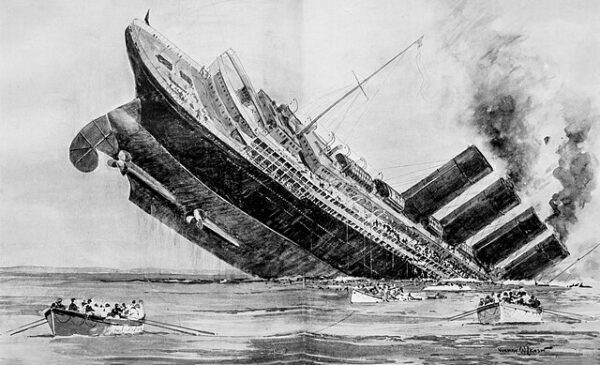On May 7, 1915, during World War I, the British ocean liner RMS Lusitania was torpedoed and sunk by a German submarine, U-20, off the coast of Ireland. The attack resulted in the loss of over 1,100 lives, including civilians and neutral passengers, triggering international outrage and significantly influencing public opinion regarding the war.
The Lusitania was one of the largest and fastest ships of its time, renowned for its luxury and speed. It was primarily used for passenger transportation between the United States and Europe. However, with the outbreak of World War I in 1914, the ship’s civilian voyages were suspended, and the British government requisitioned it for military purposes. Despite its new role, the ship continued to carry passengers, including Americans, who remained neutral at the time.
The sinking of the Lusitania had profound consequences on multiple levels. Firstly, it intensified anti-German sentiments in the United States and other neutral countries. The loss of American lives, among others, fueled public outrage and contributed to the growing pressure on the U.S. government to enter the war on the side of the Allies.
Secondly, the sinking raised questions about the conduct of naval warfare and the use of unrestricted submarine warfare by Germany. The German government defended the attack by arguing that the Lusitania carried contraband supplies for the British war effort, making it a legitimate target under maritime law. However, the large number of civilian casualties, including women and children, led to accusations of German disregard for civilian lives and sparked diplomatic tensions between Germany and the United States.
The sinking of the Lusitania also highlighted the vulnerability of civilian vessels during wartime and prompted calls for better protection of non-combatants at sea. The incident led to increased efforts to develop measures to safeguard passenger ships and to establish rules of engagement with civilian vessels.
Furthermore, the sinking of the Lusitania contributed to the erosion of neutrality among American citizens. While the United States initially maintained a policy of neutrality in the early years of World War I, the sinking of the Lusitania, along with other factors such as German submarine attacks on American ships and the interception of the Zimmermann Telegram, eventually pushed the U.S. towards entering the conflict in 1917.
In the aftermath of the sinking, investigations were conducted to determine the causes and responsibilities for the disaster. The British and American governments accused Germany of committing an act of war and violating international law. However, Germany argued that the Lusitania was a legitimate target due to its role in transporting war materials. The sinking remained controversial and debated for decades, with scholars and historians offering varying interpretations of the events leading up to the tragedy.






